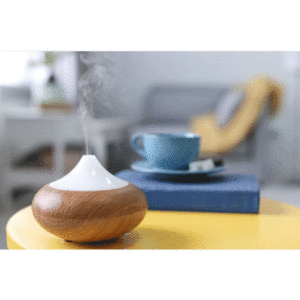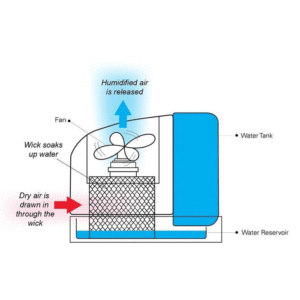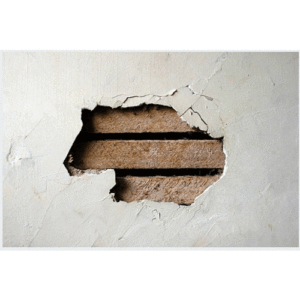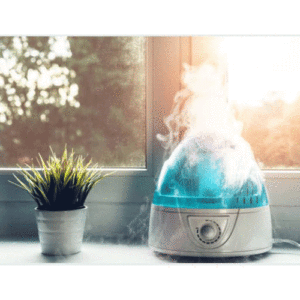Humidifiers serve the all-important purpose of relieving low humidity conditions in your home, which is achieved by converting water into a fine mist and subsequently releasing it into the air. By increasing the moisture levels in your indoor environment, these devices help to restore the level of comfort and wellness typically found in nature.
Table Of Content
The Working Mechanism of a Humidifier

The recommended indoor humidity is between 30-50%, and changing seasons will often cause changes in humidity levels in your home’s environment. In the winter, for instance, most homeowners keep their windows and doors shut and their heating system on full blast.
This causes their indoor air to dry up, triggering the onset of
cracked lips, nosebleeds, and dry skin, among other health issues, not to mention static electricity.
While there are multiple types of humidifiers in the market today, the principle is basically the same. These devices push moisture into the indoor air and hence increasing the level of humidity, improving the living conditions, and comfort for the home occupants.
Main Functionality

- A humidifier is an evaporative unit, which is largely comprised of a fan, reservoir, and wick.
- This unit operates by sucking air using an internal fan.
- The air is subsequently passed along a water-filled wick filter that has already absorbed water from the reservoir.
- This serves to moisten the air that’s subsequently compelled back into the room to circulate, giving your home an excellent balance of indoor humidity.
- The entire process is self-regulating as the evaporation from the wick is entirely dependent on the humidity levels in your home.
- It follows that a room with a lower humidity will cause a higher evaporation rate in the wick, resulting in more moisture getting pushed into the atmosphere.
Why You Need a Humidifier
Restoring an appropriate moisture level in your home will not only make your living conditions more comfortable, but it will also go a long way in alleviating the symptoms of multiple health conditions. The structural integrity of your home will also be maintained. Here are some compelling reasons why you need a humidifier.
- Moisturizing Your Lips and Skin
Once the humidity levels in your indoor environment dip down to 20-30%, your skin is bound to lose its naturally occurring moisture, making it feel itchy, tight, dry, and flaky.
occurring moisture, making it feel itchy, tight, dry, and flaky.
This is particularly true with the skin on your hands, which is endowed with fewer oil glands than the rest of your body parts. Similarly, lips consist of tender skin, and they’re, therefore, more susceptible to chapping when the atmosphere becomes drier; they may even begin to crack if left unattended.
Solution: Rather than relying on chap-stick and lotion to restore the natural glow of your skin, you may consider using a humidifier to add the much-needed moisture into your indoor environment, and thus rehydrating your skin naturally.
- Protecting your Home’s Structure and Furniture

Wooden fittings and flooring are extremely susceptible to cracking and splitting if exposed to extremely dry air. Low humidity will also cause the wooden walls and flooring comprising your home to dry out. The ultimate result is shrunken wood, cracks in the drywall, as well as creaks in the floors. You will, therefore, want to maintain optimal levels of humidity in your home if you’re looking to protect your home’s structural integrity and that of the wood furnishings therein.
- Alleviating Snoring
The majority of homeowners have no idea that dry air may trigger or increase the severity of snoring, and hence they don’t give much thought to what a humidifier can do to reduce this habit. Insufficient moisture in your bedroom atmosphere may cause the unfortunate swelling of your throat as well as nasal congestion. When this happens, the movement of air through your nose is restricted, compelling you to breathe through your mouth and consequently snore.
trigger or increase the severity of snoring, and hence they don’t give much thought to what a humidifier can do to reduce this habit. Insufficient moisture in your bedroom atmosphere may cause the unfortunate swelling of your throat as well as nasal congestion. When this happens, the movement of air through your nose is restricted, compelling you to breathe through your mouth and consequently snore.
Solution: A humidifier is an excellent addition to your bedroom for maintaining optimal moisture levels, which will ultimately mitigate the chances of snoring.
- Soothing Your Sinuses
The first culprit you should think of when dealing with sinus issues is dry air. When your sinus passages dry out, you may experience untold discomfort in your nose, or even contend with sinus pressure, nose bleeds and headaches. When your nose gets all stuffy, the easiest way to deal with it involves increasing the humidity levels in your home. By clearing out the excess mucus from your nasal passages, you may expect to breathe easier and more comfortably.
experience untold discomfort in your nose, or even contend with sinus pressure, nose bleeds and headaches. When your nose gets all stuffy, the easiest way to deal with it involves increasing the humidity levels in your home. By clearing out the excess mucus from your nasal passages, you may expect to breathe easier and more comfortably.
Solution: Running a humidifier moistens the air, which keeps your mucous flowing and hence reducing the risk of suffering from sinus congestion.
- Humidifying Houseplants

Moist air not only benefits humans but also plants. The majority of houseplants that are nurtured indoors originate from the jungle, implying that the optimal conditions for their survival include atmospheric moisture. Excessively dry air may cause your indoor plants to lose their leaves or even experience stunted growth.
Solution: Depending on the houseplant you’re nurturing in your home, a humidifier could be the one thing you need to maintain optimal levels of moisture in the air, and hence elevating the chances of your plant’s survival.
The Bottom Line
If you often wake up with dry skin, chapped lips, blocked nasal passages, irritated eyes, or congested sinus passages, a humidifier is the ideal solution to your misery.
They also come in handy when looking to promote a more natural atmosphere in your home, allowing your houseplants to grow healthier while also maintaining the structural integrity of your wood fittings.
You’ll be surprised by the difference a little more moisture in the air can make!
